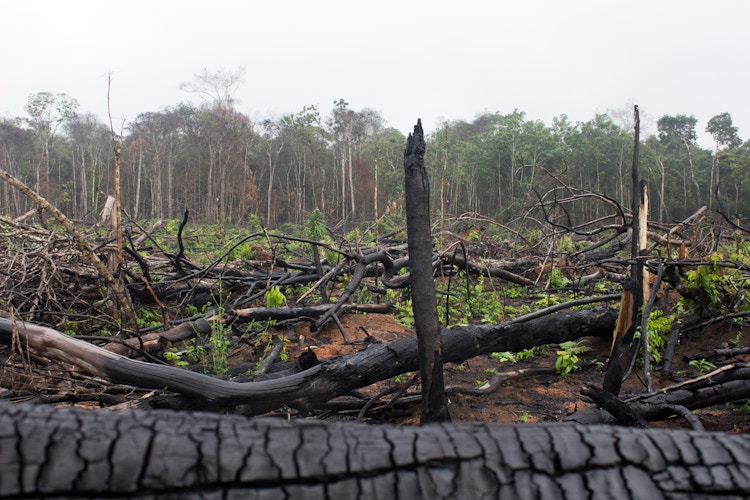The murky waters of soy fed salmon
New report reveals: The Norwegian salmon industry is linked to illegal deforestation, violent land conflict and plantations on indigenous lands through its Brazilian soy suppliers.

Deforestation in the area surrounding one of the farms that delivered soy to suppliers of the Norwegian salmon industry. Photo: Repórter Brazil
Soy production is an important cause of deforestation in South America. 75 percent of the world's soy production goes to animal and fish feed, and the demand is increasing. The soybean industry in South America is growing rapidly, at the expense of natural forests.
A report, published this week by Rainforest Foundation Norway and The Future in Our Hands, looks into the soy supply chains of the Norwegian fish feed producers Marine Harvest, Skretting, Ewos/Cargill, BioMar and Polar Feed/Europharma.
These five companies supply all the Norwegian fish farmers – meaning more than half of the global salmon production. They get about 90 percent of their soy protein concentrate (SPC) from only three Brazilian companies, CJ Selecta, Imcopa and Caramuru.
The report shows how these three companies are linked to illegal deforestation, land conflict, soy on indigenous territories, illegal pesticides and slave-like labor conditions, through their supply chains.
Download the report Salmon on soy beans - deforestation and land conflict in Brazil
The Norwegian government plans for a fivefold increase in the aquaculture industry. Everything else equal, such an increase will inevitably lead to a fivefold increase in soy imports for Norwegian fish feed, unless the feed composition changes. Indirectly, this will contribute to increased deforestation.
Direct and indirect deforestation effect
The soy imported by the Norwegian Salmon industry is certified by the ProTerra scheme, which means that it is unlikely that the physical soy imported to Norway comes from newly deforested areas.
However, the same suppliers that sell certified soy to Norway, also trade in soy from farmers involved in deforestation and other social and environmental damage. The high demand for soy has significant indirect land use effects, so that demand growth contributes to overall deforestation. The areas needed to produce the soy exported to Norway are significant; it can therefore be assumed that Norwegian imports contribute to indirect deforestation.
Rainforest Foundation Norway’s recommendations
In order to avoid contributing to an industry that is not in control of its expansion, the Norwegian aquaculture industry must reduce its soy consumption, in favor of sustainably produced protein sources. For the soy still being purchased, stricter requirements must be imposed on the suppliers, and the supply chains must be fully transparent.
Companies that buy soy must adopt and implement strong "No Deforestation policies", including:
- Only buy from producers that are not linked to deforestation or human rights violations, directly or indirectly through their supply chains.
- Acquire complete knowledge of where exactly, and under what conditions, the soy is produced.
- Be transparent about their supply chains, right down to farm level.


